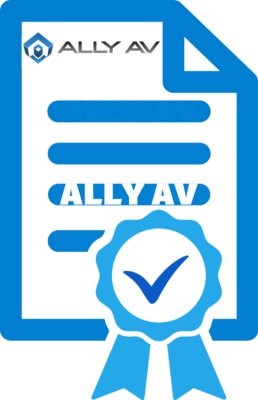 Ally AV wants and strives for excellence in service, relationship growth and experiences from our clients but also from our technicians. Life is about learning and growing from building upon day to day experiences. Ally encourages our staff to be proactive and to stay ahead of the constant change in technology, and the applications of this technology.
Ally AV wants and strives for excellence in service, relationship growth and experiences from our clients but also from our technicians. Life is about learning and growing from building upon day to day experiences. Ally encourages our staff to be proactive and to stay ahead of the constant change in technology, and the applications of this technology.
Ally AV believes in building confidence in the relationship between our customers and our service representatives. In this spirit, Ally AV has created a Competency and Proficiency Scale that clarifies the Skill Level Classification that our Audiovisual Technicians (AV Techs) have achieved in combination through their experience on-the-job and through educational instruction.
![]() Ally AV has created several categories within the Competency and Proficiency Scale which include, but not limited to, the Basic, Intermediate, Advanced, and Expert AV Tech shown in the chart below. This chart is to help you understand and choose the Ally AV Technician Certification that will best fit your needs for your event or budget.
Ally AV has created several categories within the Competency and Proficiency Scale which include, but not limited to, the Basic, Intermediate, Advanced, and Expert AV Tech shown in the chart below. This chart is to help you understand and choose the Ally AV Technician Certification that will best fit your needs for your event or budget.
Competencies & Proficiency Scale |
Skill Level Classification |
Description |
| Basic | Class 1 | The AV Technician has the level of experience gained in a classroom or as a trainee on-the-job, and perform basic AV tasks such as:
|
| Intermediate | Class 2 | In addition to Class 1, the AV Technician is able to successfully complete tasks competently and can perform independently:
|
ADVANCED |
CLASS 3 |
In addition to Class 2, the Class 3 AV Technician operates within a specific skill providing focused support to the client and the event in the individual area of Video, Sound, Recording, Video Switching, Multimedia or Majority of specific skills including Sound, Video, Recording, Video Switching, and/or Multimedia. Specific Class 3 skill levels are described below. |
| Advanced | Class 3: Major | In addition to Class 2, the AV Technician operates within a specific skill providing focused support to the client and the event:
|
| Advanced | Class 3: Sound | In addition to Class 2, the AV Technician operates within a specific skill providing focused support to the client and the event:
|
| Advanced | Class 3: Video | In addition to Class 2, the AV Technician operates within a specific skill providing focused support to the client and the event:
|
| Advanced | Class 3: Switch | In addition to Class 2, the AV Technician operates within a specific skill providing focused support to the client and the event:
|
| Advanced | Class 3: Multi | In addition to Class 2, the AV Technician operates within a specific skill providing focused support to the client and the event:
|
EXPERT |
CLASS 4 |
In addition to Class 3, the Class 4 AV Technician provides additional expert levels in event management and readiness. Specific Class 4 skill levels are described below. |
| Expert | Class 4: Specialist | In addition to Class 3, the AV Technician provides additional expert levels in event management and readiness by:
|
| Expert | Class 4: Audio Engineer | In addition to Class 3, the AV Technician provides additional expert levels in event sound system management and readiness by:
|
EXPERT |
CLASS 5 |
In addition to Class 4, the Class 5 AV Technician provides additional expert levels in audience experience and interaction. Specific Class 5 skill levels are described below. |
| Expert | Class 5: Specialist | In addition to Class 4: Specialist, the AV Technician provides additional expert levels in audience experience and interaction by:
|
